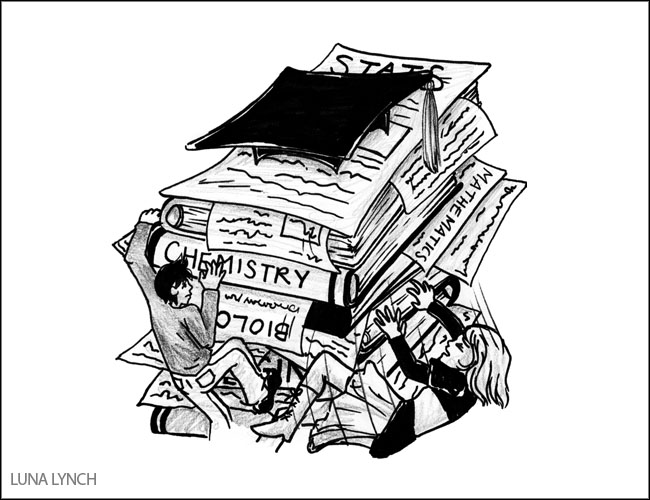
American politicians and scholars have made one thing very clear: the United States is far behind the rest of the world in the STEM areas—science, technology, engineering, and math. According to the New York Times, officials have called for colleges to graduate 10,000 more engineers per year in addition to 100,000 more STEM teachers. However, recent studies reported in the New York Times have found that while more students than in previous years pursue STEM majors, about 40 percent switch majors or fail to receive a degree.
The pressure on America’s youth to pursue and achieve in the sciences is now more prevalent than ever. To many Aragon students, science has a large effect on the courses and activities that they pursue.
Many Aragon students and alumni have attachments to the STEM fields. Yuzo Yanagitsuru, an Aragon alum and sophomore at UC San Diego majoring in Ecology, Behavior, and Evolution, also credits Aragon with his college choices. “[My classes at Aragon] definitely gave me the self-confidence to pursue science.”
While Aragon students may be extremely enthusiastic about the sciences during high school, it can be challenging to stay enthusiastic when taking college level STEM classes. Wienbar says, “I’ve heard from friends in college that majoring in most sciences is very difficult, but if you are passionate about the subject, it’s worth it.”
Teacher Steve Ratto also points out that students are required to be more independent in college. “You have to figure more out on your own. You have to be responsible for yourself and your learning,” Ratto says.
What baffles experts is why so many intelligent students are leaving the sciences at college.
Julia Borden, an Aragon alumna at Brown University reasons that there are many incentives to stay in science. She says, “Science majors have more secure job opportunities after college than humanities majors. I’ve even heard of people forcing themselves to stick with a hard science even if they’re not enjoying it because of job opportunities.
Jeff Ware, an Aragon alumnus and a freshman mechanical engineering major at UC Davis has witnessed this defeat among his peers. He says, “It doesn’t surprise me [that so many students switch majors]. Many of my friends [at Davis] have already decided to leave engineering or the sciences. The reason is almost always because of the amount of work involved and the difficulty level of the material.”
Engineers often have a tough start, especially at the Universities of California, where engineering majors are required to take 16- 20 units per semester compared with the 12 units of other majors.
Organic chemistry is also another class which discourages students. Borden says, “Many pre-meds and bio majors switch after that class.”
Others believe the change is just natural to the college experience. Says Yanagitsuru, “College is a place where you learn a lot about yourself, and sometimes, that prompts some students to change their majors. You learn a lot about yourself not only through classes, but the opportunities to talk to professors and work in a lab.”
Despite these reports, some Aragon students are not concerned about the rigor of college science. Senior Sophia Wienbar says, “I feel mostly prepared for college level science.”
Ware says that a student’s success rate in the college sciences has a lot to do with how their high school prepares them. Ware says, “It can be pretty brutal at times, especially if a student’s high school didn’t adequately prepare them or if they are not willing to put in a ton of time. Calculus at Aragon definitely prepared me well for calculus here.”
For all Aragon students wanting to pursue the sciences at a college level, Science teacher Asif Rahman advises to take advantage of the classes offered at Aragon. “I encourage students to double up and explore,” he says. “It’s better to fail in high school while you have the support of your teachers. In high school, you may be the big fish in the little pond, but when you get to college, you become the little fish in the big pond.”




